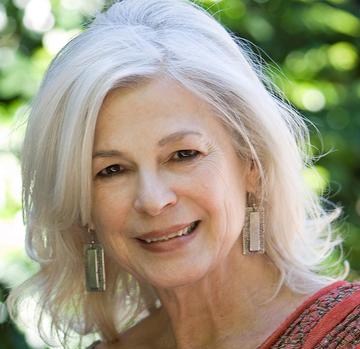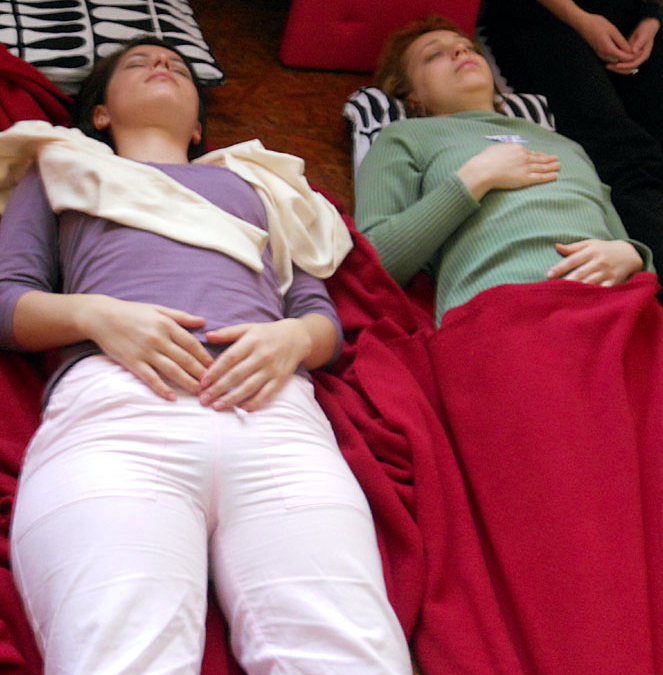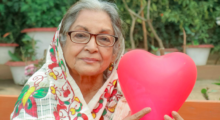Today SevenPonds speaks with Maneesha James, who explores meditation as a resource for all aspects of living and dying. Maneesha lives in London, England and graduated in nursing, midwifery and psychiatry. She’s had a number of influences that have changed her life; she had the privilege of being close to Osho, an Indian mystic, guru and spiritual teacher for 15 years (particularly in his early experimentation phase with meditation). She also spent time with Anna Freud, Sigmund Freud’s daughter, in the last moments of Ms. Freud’s life. In those moments, she realized the potential for meditation as a part of the dying process. Maneesha James has traveled around the world giving seminars to groups and individuals on a wide spectrum of meditation.
 Suzette: You specialize in mediation for those who are dying. How do you view your work today?
Suzette: You specialize in mediation for those who are dying. How do you view your work today?
Maneesha: I see dying as an aspect of living. It’s our [next] journey. Most people are wrought with anxiety [on the topic]. Zeitgeist guides us to the right time to talk about it. Look it in the face and find a way to be with it.
Suzette: I value mediation but I’m not one of those people who likes to lay still and meditate. How do I learn to meditate?
Maneesha: You do not need to lay still to meditate — there are so many ways one can achieve it.
Suzette: I like motion — when I’m driving on an expressway or sitting on a train, for example.
Maneesha: There is a difference between extroverts and introverts meditating. For extroverts, laying still and closing our eyes is difficult for active minds; we can’t just switch them off. There’s many ways to meditate and for some physical exercise [is more effective] than quiet time. So you use motion, [for example] and do not need to learn to meditate. You already do. There are [so] many ways.
Suzette: What issues come up for people when they are dying?
Maneesha: We are rolling along in life, with love and [various] challenges. Then we think death is a punch line. [But] this is not real — we are already dying. Every breathe we take we die a little bit more. The trees have red and green leaves; they are not all green.
There is a huge misunderstanding about death. It can be a climax totality and a crescendo. For the Boomers, life is about life and growing up to extract whatever learnings we have from marriage and divorce. Why would it be different in death? They choose to go through life consciously and there’s as much to gain going through death consciously.
“We are rolling along in life, with love and [various] challenges. Then we think death is a punch line. [But] this is not real — we are already dying. ”
–Maneesha James
 Suzette: People can get very depressed at the end of life as they sense death approaching. Why is this?
Suzette: People can get very depressed at the end of life as they sense death approaching. Why is this?
Maneesha: We have a difficult time being alone as death approaches. Even with loved ones around we know we die alone. We must let go of control. Let go of our independence.
“Even with loved ones around we know we die alone. We must let go of control. Let go of our independence.”
–Maneesha James
Often, there is unfinished business. We can’t keep stuff down. We need an apology or are hanging onto a wound. When we leave the body, anything incomplete will hang around. This is what life is all about — there is not clarity as we live life. [And] those are the kinds of issues [that arise].
Suzette: So mediation helps this process?
Maneesha: Yes, the divisions between ourselves and our world are blurred when we have this awareness. The magic thing is we live more beautifully. All that matters is love.
Maneesha James’ 4 Tips For a Successful Meditation
1) Get physical! Do physical exercise before you start.
2) Boredom and Bliss: your mind will get bored but continue undeterred and, when emerged from [this] bliss, move beyond [itself].
3) Don’t Push: your mind will tell you you’re done before you have begun — but continue on.
4) Go For It! [The] degree of participation is more important than how long [one meditates].
Suzette: Tell me about your experience with Anna Freud.
Maneesha: I was with her when she died. I helped wash her body in her house. When she died a silence descended on me, a very still blanket. I felt her energy and wanted to explore it — that primal part of life, that inner garden.
Suzette: Thanks for your time.
Maneesha: Thanks, you too.
More SevenPonds Interviews:
- A longtime oncologist shares his thoughts on coping with a terminal condition and dying a “good death”.
- We discuss the Threshold Choir’s mission to provide lovely, comforting songs to the ill and dying.
- How to Transition Through Grief and Loss? An Interview With Ligia Houben

 What Are the Tools for Meditating While Dying? An Interview With Maneesha James
What Are the Tools for Meditating While Dying? An Interview With Maneesha James


 Having an Estate Plan Is Essential – So Is Discussing It With Your Children
Having an Estate Plan Is Essential – So Is Discussing It With Your Children

 “Summons” by Aurora Levins Morales
“Summons” by Aurora Levins Morales














